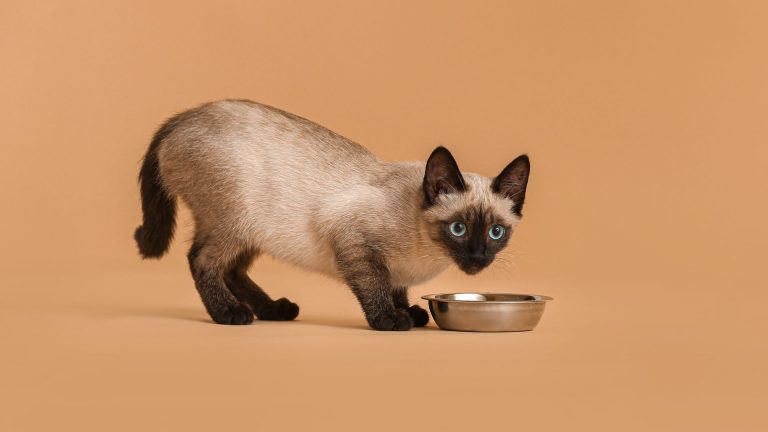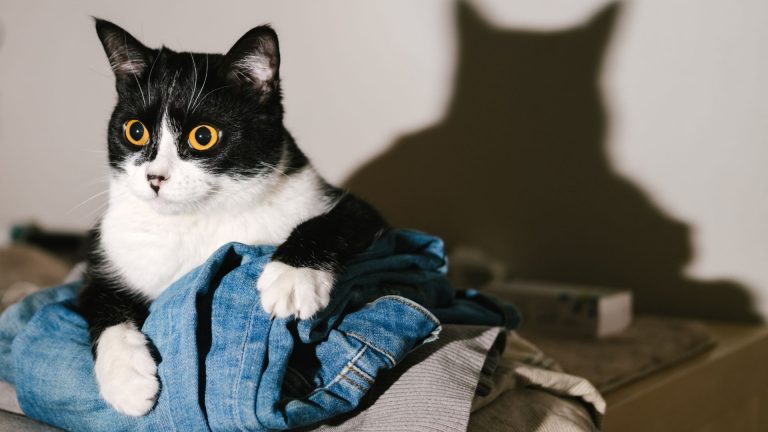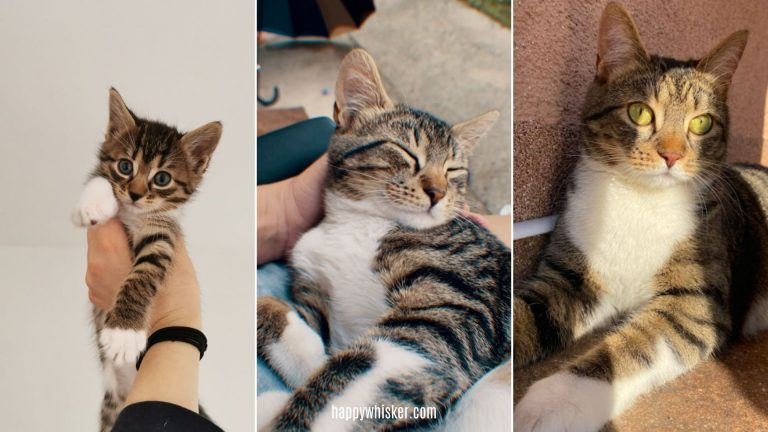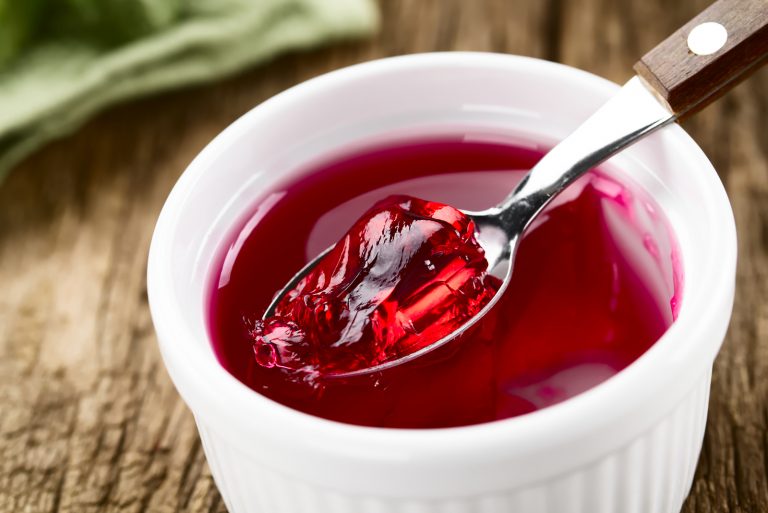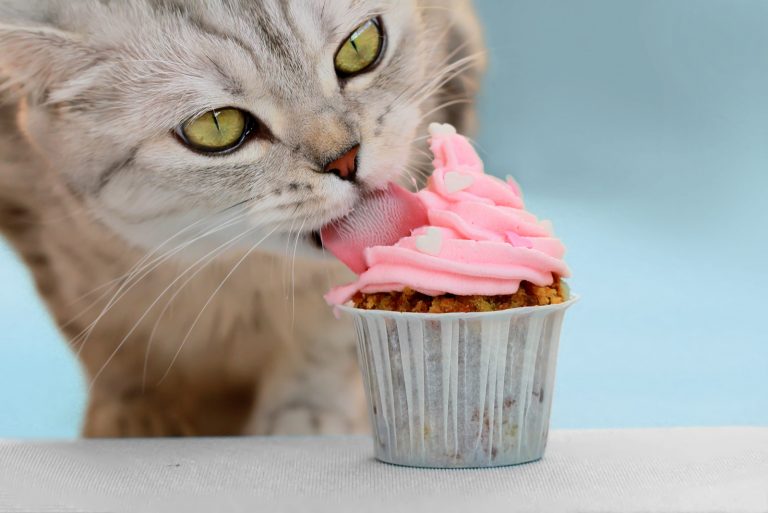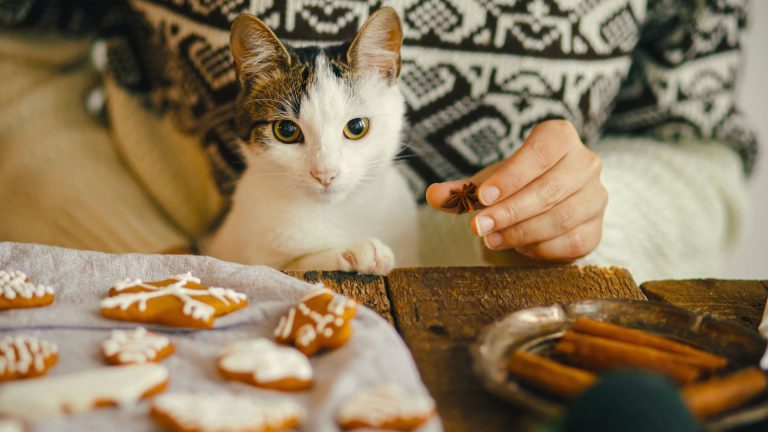Can Cats Eat Lamb Meat? Yummy Cat Menu
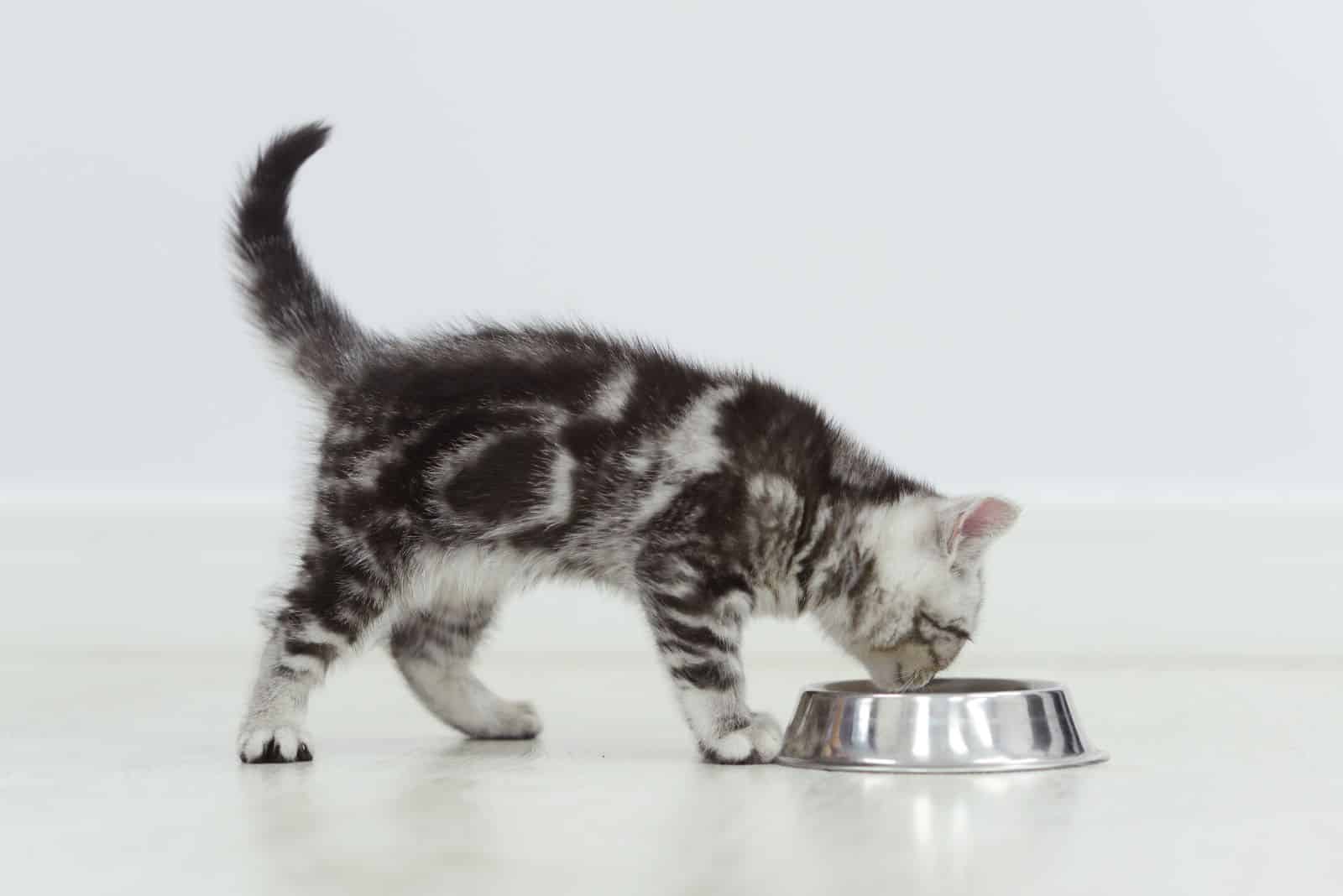
This post contains affiliate links, and I will be compensated if you make a purchase after clicking on my links, at no extra cost to you.
Cats are obligate carnivores which means that they need a healthy and balanced diet based on real meat and protein. However, not every type of meat is good for a cat’s diet.
There are some types of meat that contain significant quantities of ingredients that cats cannot benefit from or are likely to cause them harm.
Usually, when buying cat food, you will find cat food with chicken, beef, pork, and fish… but what about lamb? Have you ever seen cat food with lamb? Can cats eat lamb meat at all?
If you don’t know the answer to this question, then you’ve come to the right place. This article will provide you with everything you should know about cats consuming lamb meat and other important information about your cat’s diet.
So, make yourself comfortable and enjoy this article!
Can Cats Eat Lamb Meat?
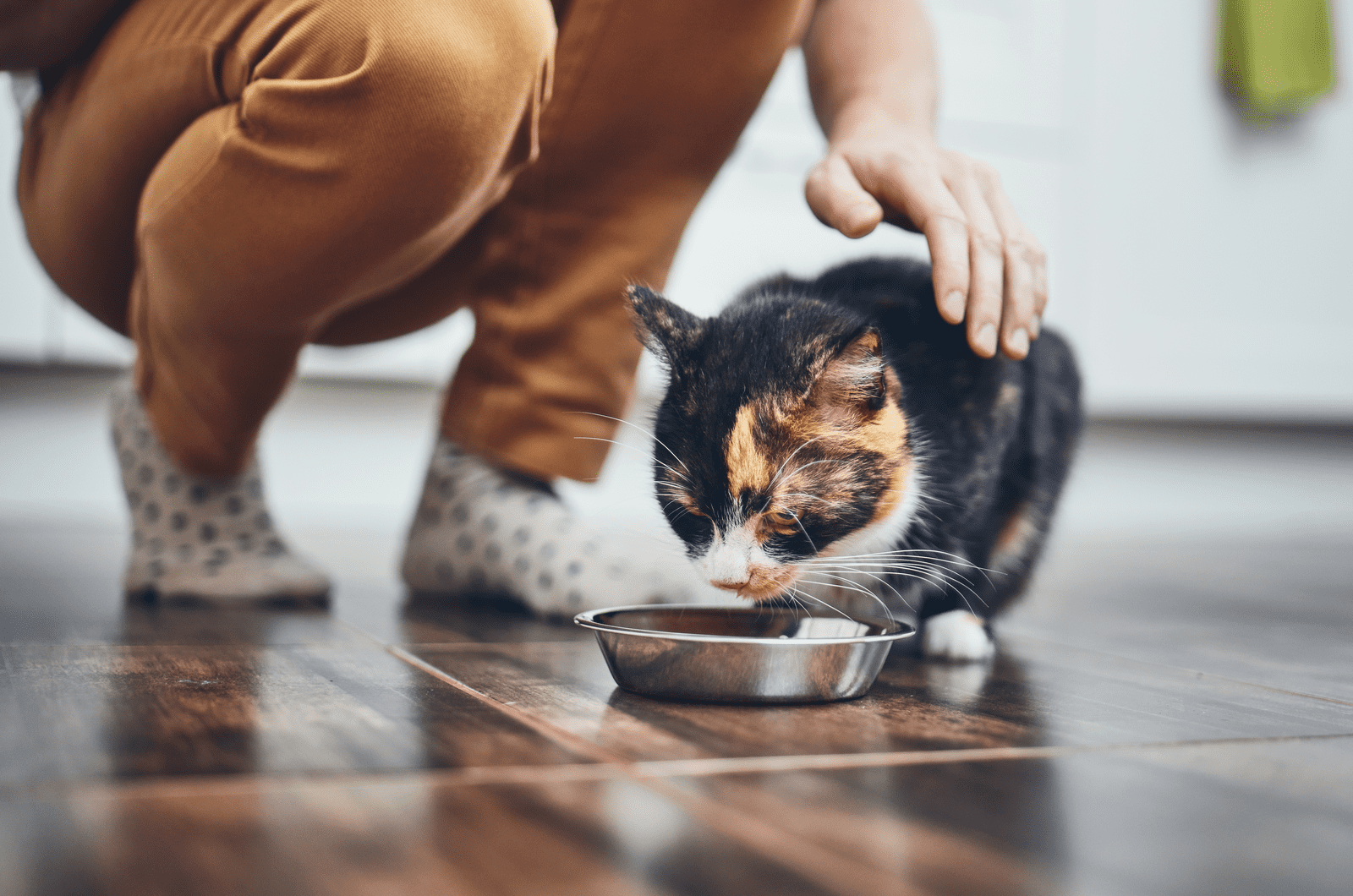
Every pet owner knows that cats adore meat, however you’ll also know that just because they adore something doesn’t mean that it’s safe for them or that they should eat it.
If you’re a cat parent, especially for the first time, then it is important to know which foods are safe for your cat and which ones are not. You should provide your feline friend with the foods that fulfill its nutritional needs.
A cat’s diet should be based on meat and animal protein, therefore you may assume that any type of meat is perfectly safe for your cat. Unfortunately, this is not the case. Lamb meat, for example, is less often seen in commercial cat food. Why not? Can cats eat lamb meat at all?
Technically, cats can eat lamb meat. However, lamb meat contains relatively high levels of carbohydrates and fat content which is not good for cats as it may lead to obesity, and other health problems.
If you do decide to feed your cat friend lamb, make sure you prepare it properly, and give it to your cat in small amounts and only occasionally.
If you’re feeding your cat lamb meat for the first time, then let her take a small bite and monitor the cat’s condition and behavior for the next 24 hours. If there are no unusual symptoms such as vomiting, diarrhea, scratching, or coughing, you can continue giving lamb to your cat as an occasional treat.
Is Lamb Meat Good For Cats?
Lamb meat is fine for cats as long as it’s given as an occasional treat. It’s one of the most expensive types of meat because it’s healthy for humans.
It’s good for cats to a certain degree because it contains protein, zinc, calcium, niacin, iron, potassium as well as vitamin D, vitamin B2, and vitamin B12. It also contains riboflavin and all the necessary amino acids that a cat needs in order to survive and support its immune system.
Cats do benefit from the nutritional content of lamb meat. For example, it’s essential that a cat’s diet contains niacin, because the absence of niacin in the cat’s diet may cause them to get sick.
A niacin deficiency may cause cats to have seizures, skin problems, and even anemia.
Lamb meat is also good for cats because it contains high levels of phosphorus which has an important role in a cat’s bone health. Moreover, it helps in preventing taurine deficiency, which can lead to blindness or serious heart disease.
However, this type of meat is only healthy for cats when it’s given in small quantities, because larger amounts of lamb meat may lead to obesity or other health issues, due to its fat content and the carbohydrates it contains.
If you want your cat to eat lamb meat without any risks, it’s very important to prepare it properly. So, if you continue reading this article, you’ll also find some advice on how to prepare yummy lamb meat for your feline friend.
Suggested Read: Can Cats Eat Crab? Read On To Find Out!
Is Lamb Meat Bad For Cats?
The main reason why it isn’t the smartest idea to feed cat lamb meat as regularly as other types of meat, is because it contains more carbohydrates and has a high fat content.
Carbohydrates are good and healthy for cats but only in small amounts as they cannot keep the cat as full as protein can.
Cat food shouldn’t contain more than 20-25% of carbohydrates because food with high amounts of carbohydrates don’t make the cat feel full and therefore they continue eating more and more – risking obesity and other health problems.
Also, lamb fat contains high amounts of omega-6 fatty acids. These are healthy in appropriate amounts, especially for the cat’s skin. However, if consumed frequently or in high amounts, these fatty acids can also have negative consequences for your feline friend, causing asthma, arthritis, allergies, etc.
Moreover, lamb is also high in cholesterol and it is believed that this type of meat contains certain fatty acids that may cause cancer in humans and animals.
As far as lamb skin is concerned, this is also not a good choice for your cat as it contains high amounts of saturated fats. Saturated fats affect the cat’s arteries, leading to heart disease.
It’s very important to avoid giving lamb skin to your cat as it can also trigger food poisoning in cats.
Can Cats Eat Raw Lamb Meat?
Meat should always be prepared properly before giving it to your cat. Cats should never eat raw lamb meat as it may contain parasites and bacteria that may infect the cat when they ingest it.
If a cat gets infected by parasites or bacteria, they may experience several symptoms such as vomiting, diarrhea, loss of appetite, and similar. If this happens, it’s very important to contact your vet and take your feline for a check-up.
Moreover, if you’re not sure what food to give your cat, you can always consult with your vet who will give their professional recommendation for the best cat food, how to prepare it, what is good and what is bad for cats, as well as a few tips for planning a feeding schedule.
So, if you want your cat friend to have a healthy diet, then you should listen to the professionals!
Recommended Read: Can Cats Eat Hot Dogs? Here’s What You Need To Know
Can Cats Eat Cooked Lamb Meat?
If you decide to feed your furry friend lamb meat, it’s very important to cook it before serving it to your cat.
As mentioned previously, raw meat may contain parasites and bacteria. If you want to prevent your cat from getting infected, then you should cook the meat thoroughly.
Make sure that the cooking temperature isn’t below 145°F. It’s very important that you cut out any fat from the lamb meat before serving it as it may cause food poisoning.
You can mix the meat with rice or something similar, however, make sure you completely avoid any kind of sauce, herbs, and seasoning such as salt, garlic, etc.
Seasonings and spicy things aren’t good for cats and may cause them serious health issues.
Therefore, there’s no need to add these things into the cat’s meal, and don’t worry, it won’t be tasteless. During the cooking process, the meat produces its own juices which are extremely tasty for cats so they don’t need extra additives.
Can Cats Eat Lamb Fat?
Cats can eat lamb fat, however, only as an occasional treat. Most of the time you should avoid feeding your cat lamb fat so it’s best to cut off any excess fat before giving lamb to your cat.
The reason for this is that lamb fat contains high amounts of saturated fats, and frequent consumption of this type of fat may cause clogged arteries and lead to certain heart issues.
It can also cause food poisoning, so make sure that you avoid lamb fat most of the time.
Can Kittens Eat Lamb Meat?
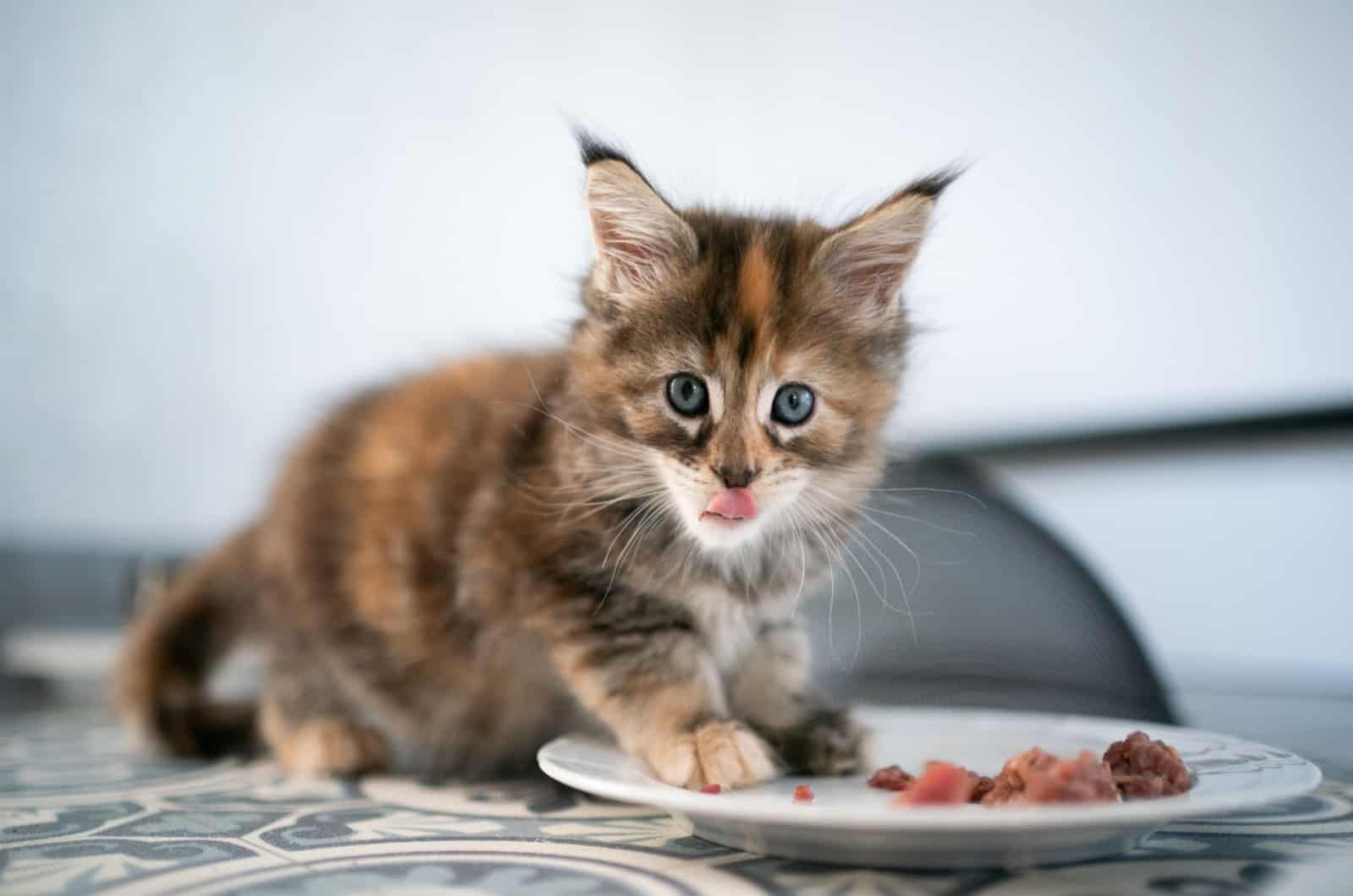
When it comes to kittens who have weaned and are eating solid food, lamb meat is very good for them. It’s better to give kittens wet food rather than dry food such as kibbles, because a wet food diet is more hydrating and easier for them to chew.
Small kittens should be fed 3-4 times a day. It’s very important to keep up with the schedule because the period when they stop nursing and start eating real food is crucial for them.
During weaning, their immune system gets weaker due to the loss of their mother’s nutritional milk. So, in order to improve the kitten’s immune system and boost its overall health, you should provide it with the nutrition that it requires.
Luckily, lamb meat has everything that a kitten needs. Kittens require a lot of taurine, and lamb meat has high amounts of this. Lamb meat helps them in preventing taurine deficiency which may cause serious health problems such as blindness, or heart issues.
Lamb meat also contains niacin which is very important to strengthen the kitten’s immune system. If a kitten doesn’t receive enough niacin it may suffer from various problems such as seizures, arthritis, asthma, etc.
Kittens eating lamb meat tend to grow better as it contains phosphorus which is healthy for a growing kitten’s bones. In addition, lamb meat also contains calcium, zinc, potassium, vitamin D, vitamin B2, and vitamin B12, all which are essential for maintaining a kitten’s health.
Are There Any Cat Foods With Lamb Meat?
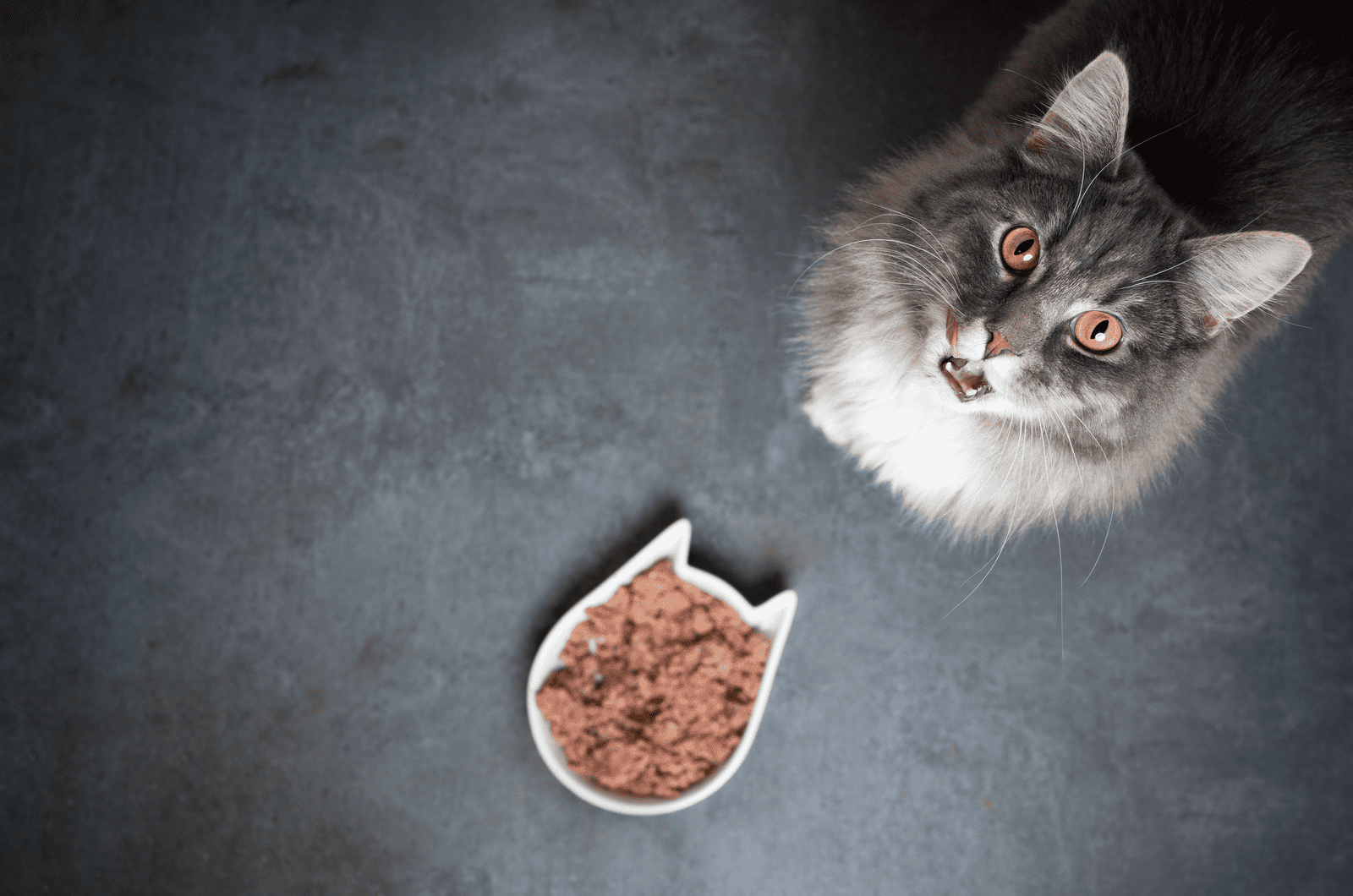
It’s more common to find commercial cat foods that contain other types of meat than lamb. However, cat food with lamb meat does exist and comes in kibbles and canned options.
Always read the serving size on the packaging and give lamb-based cat food in moderation. Read on if you’re interested in finding out the best dry and wet pet food containing lamb meat.
3 Best Lamb Dry Cat Foods
• Purina Pro Plan Sensitive Skin And Stomach Cat Food, Lamb And Rice Formula
• Solid Gold – Katz – N – Flocken With Real Lamb & Brown Rice
• Open Farm Pasture-Raised Lamb Grain-Free Dry Cat Food
3 Best Lamb Canned Cat Foods
• Feline Natural Canned Cat Food
• Instinct Original Grain Free Real Lamb Recipe Natural Wet Canned Cat Food by Nature’s Variety
• Weruva Cats in the Kitchen, Lamb Burger-ini
How To Prepare Lamb Meal For Your Feline?
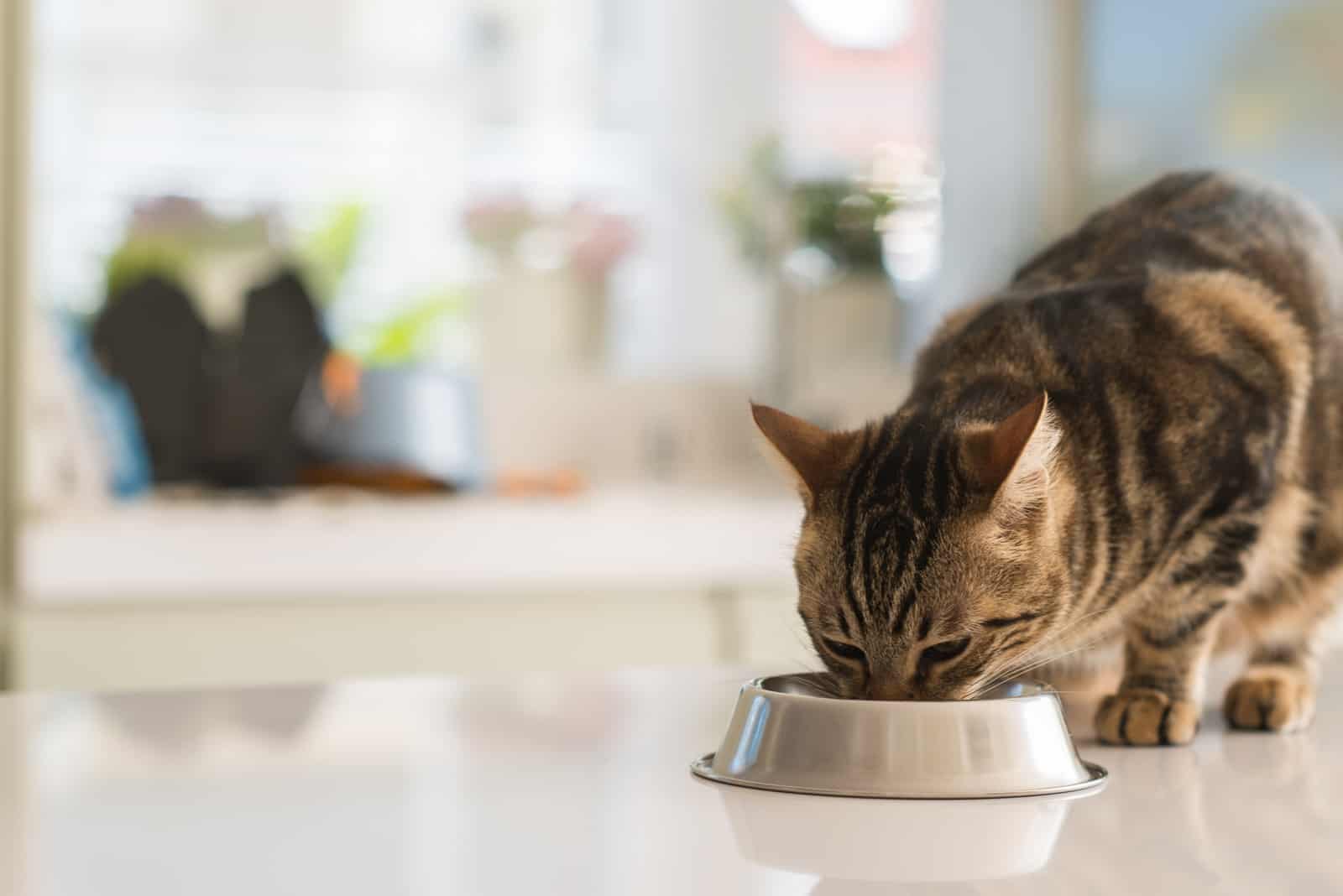
If you want to feed your feline friend lamb meat, then it’s highly important you prepare it properly.
As previously mentioned, lamb meat may be contaminated with parasites and bacteria, therefore it’s essential that you cook it thoroughly before giving it to your cat. Cook the meat at a temperature no less than 145°F.
Cat owners who give their cats lamb usually mix it with brown rice. So, besides cooking the meat, make sure that you cook the rice separately from the meat, as their cooking temperatures are different.
When the meat is cooked, you should drain and rinse it in order to remove excess fat, and then leave it until it cools completely.
When it’s done cooling, mix both meat and rice in a bowl, and you can add two tablespoons of flaxseed oil. That’s it. Just separate the mix into meals and keep it in the fridge. If you’re not going to use the meal within the three days, then you should freeze it.
When preparing lamb meals for your feline, remember that you don’t need to use any herbs, seasonings, or similar additives, as these can only cause harm to cats..
Furthermore, you should know that this lamb dish shouldn’t be a cat’s main meal, but rather an occasional treat, mostly because of its high fat content, and because it lacks some other nutrients that are necessary in a cat’s diet.
Therefore, you should use high quality cat food for the majority of your cat’s diet, in order to satisfy their nutritional needs, and to keep the cat’s health in order.
What Other Type Of Meat Is Safe For Cats To Eat?
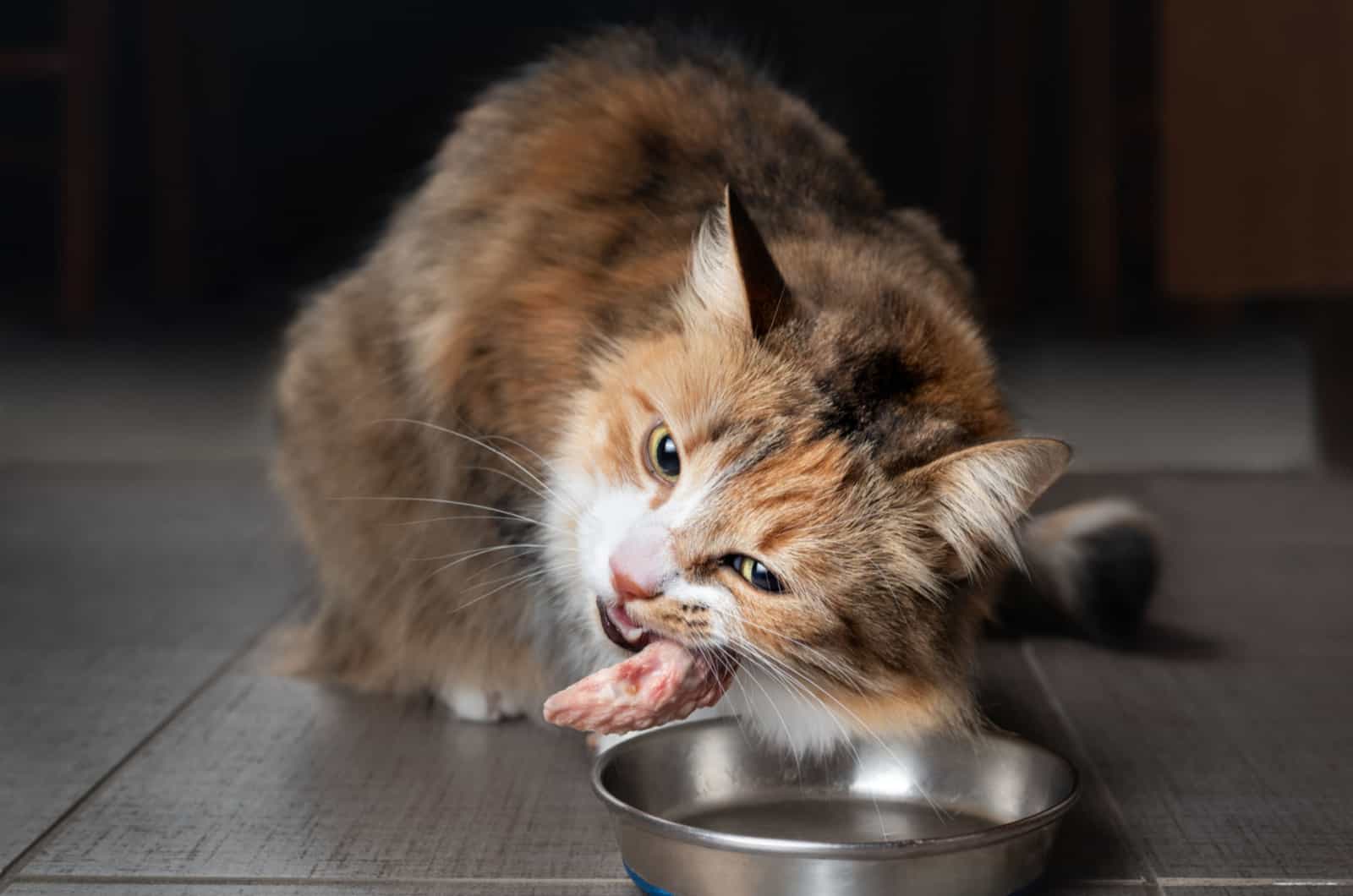
Besides lamb meat, there are other types of meat that are good and healthy for cats to eat. Some of these meats are more often seen in commercial cat food. However, some cats may have allergies to certain types of meat.
Therefore, it’s highly important that you know what other types of meat are safe for cats to eat in order to know what to offer as an alternative meat if problems occur.
Pork
If you’re willing to give pork meat to your cat, you should pay attention to a few things before you use it. Pork is safe for cats to eat, but only occasionally and in small amounts as it contains high amounts of fat, just like lamb.
However, when feeding a cat with pork meat, make sure that you’re using cooked pork, as raw food may contain parasites and bacteria and you certainly don’t want your cat to get infected.
Moreover, use unprocessed pork meat without salt and similar additives. This is the safest option, as salt isn’t good for cats.
However, be careful when it comes to pork meat products such as bacon, hot dogs, ham, and similar as they contain high amounts of salt, preservatives, and flavorings which cannot provide our felines with any health benefits and may cause illness.
Chicken And Turkey
Chicken and Turkey are perfect types of meat for cats. They’re extremely healthy because they are rich in protein and have low amounts of fat, making them a perfect cat meal.
An important thing to remember is never to feed a cat raw chicken or turkey meat, as they can contain salmonella or E.coli. That may lead to serious health issues.
In addition, before giving a yummy piece of chicken or turkey meat to your cat, make sure that you remove the skin and bones in order to avoid choking hazards.
You might find this article interesting: Can Cats Eat Chicken Nuggets? Everything You Need To Know
Beef
Beef is perfectly healthy for cats to eat. It contains all the necessary nutrients that a cat needs.
It’s high in taurine, which is very important for cats, it contains amino acids, protein sources, vitamins, and minerals, everything that’s necessary for a cat’s healthy and balanced diet.
You can give your cat friend either cooked or raw beef meat. However, if you decide to feed her raw meat, make sure that it is fresh, or if you don’t want to risk possible parasite or bacteria infection from raw meat, then you should cook it first.
Don’t feed your feline beef that was prepared for humans, because it usually contains seasoning, herbs, flavorings, and other additives that aren’t safe for cats.
Duck
Duck meat is good for cats, but just like lamb meat, it should only be given rarely as a treat. The reason why duck meat shouldn’t be given more often to cats is that it has high fat content; higher than chicken and turkey.
Before giving the duck meat to your feline friend, make sure that it’s cooked thoroughly. Also, as with chicken and turkey meat, you should remove the bones and the skin from the meat in order to avoid a choking hazard.
Of course, avoid sauces, seasoning, or flavorings when you give the duck meat to your kitty!
Fish
Fish meat is good for your cat as long as it’s not raw, and only used as an occasional treat. Raw fish meat may contain parasites that can cause your feline friend harm.
Moreover, you should pay attention to any tiny bones and remove every one of them before giving fish to your cat.
In addition, don’t give the cat canned fish produced for human consumption as it usually contains high amounts of oil and salt.
Related: Can Cats Eat Sardines? Many Benefits And A Couple Of Risks
Game Meats
Game meats are perfectly safe for cats as an occasional treat. These include venison, rabbit, pheasant, etc.
Organs
Cats are hunters in nature, therefore when they catch prey, for example a bird or a mouse, they eat their organs.
So, organs are safe for cats and they can have many health benefits. However, you still need to pay attention to the amount of organ meat your cat consumes, in order to prevent certain health issues.
There are some benefits to cats from eating liver. However, special attention is essential because consuming too much liver may lead to vitamin A toxicity which may cause bone problems and other health issues; it can even lead to death.
The same situation happens if the cat consumes too much kidney meat. However, heart meat is very beneficial for cats as long as it’s given only as an occasional treat. It’s not recommended to give the heart meat to a cat often, because it is high in fat.
Tripe and gizzards are also good occasional treats. For easier consumption, you can cook them and cut them into small pieces.
Are Meat Bones Safe For Cats?
Bones are the favorite dog’s food to chew. Well, the situation with cats is a bit different. They’re not such bone lovers as dogs are, but some cats may be interested.
First of all, remember that you shouldn’t give your furry friend small bones as they can be a choking hazard.
Cooked bones are not an option either. They’re prone to splintering and may cause serious damage to the cat, from choking to internal injuries.
It’s best to avoid meat bones as eating them may lead to constipation. However, if you want to give your feline something to chew, then provide her with a bigger bone that she cannot swallow or bite off, and that cannot injure her. On the other hand, you can simply provide her with a chewy toy.
Bad Human Food For Cats
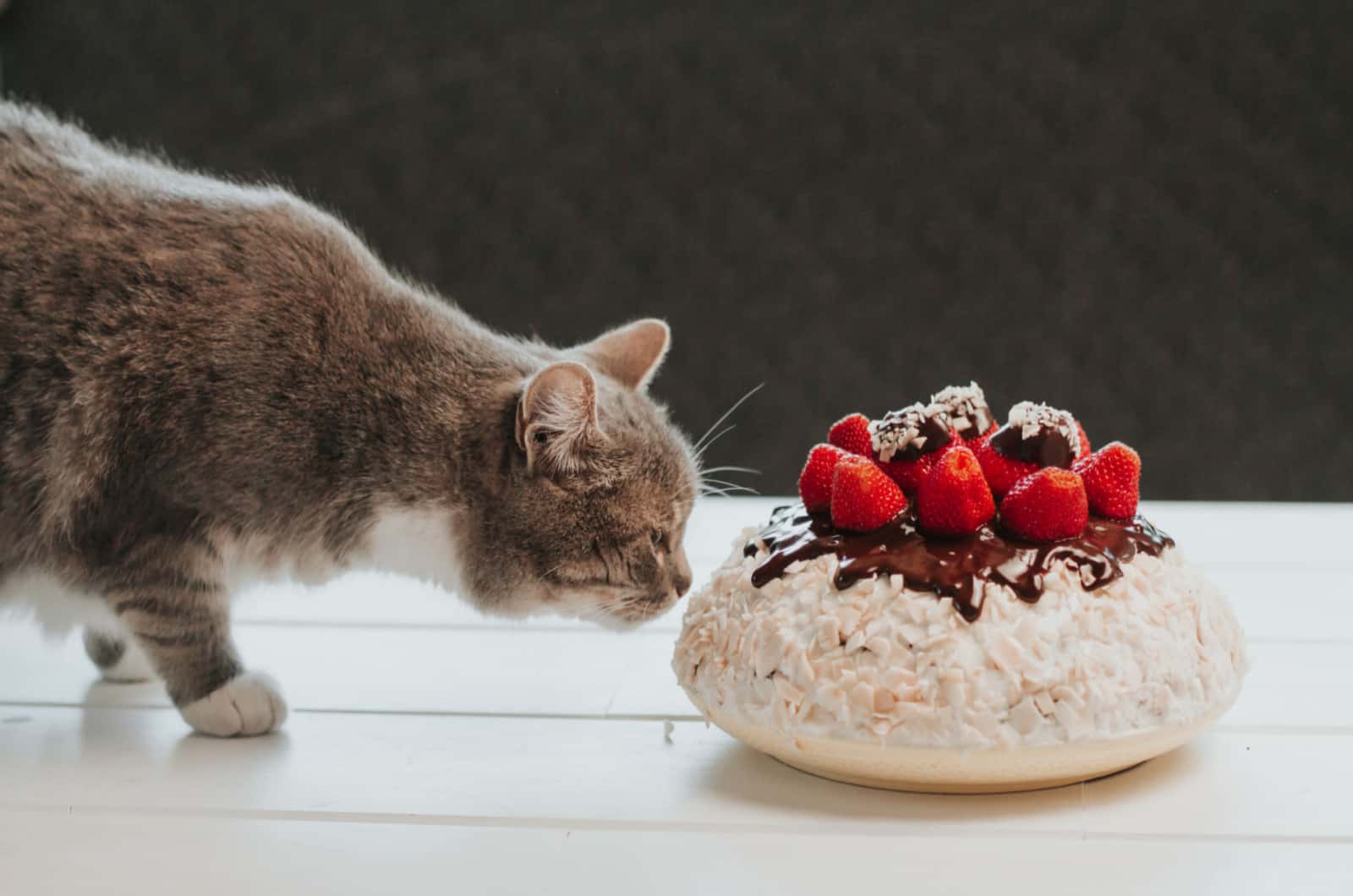
Although cats adore watching you eat something, and often want a small piece of whatever you have, it’s not always a good thing. Most human food isn’t healthy or safe for felines.
It’s important that every cat owner is aware of this so they can provide their cat with a healthy and balanced diet. In order to keep your cat healthy, you should avoid following types of human food:
• Chocolate
• Salt
• Garlic
• Tomatoes
• Raw eggs
• By-products
• Potatoes
• Caffeine drinks
• Grapes
• Citrus fruit
• Alcohol
• Mushrooms
• Nuts
Interesting Read: Can Cats Eat Hummus? It’s Not Recommended And Here’s Why
FAQ
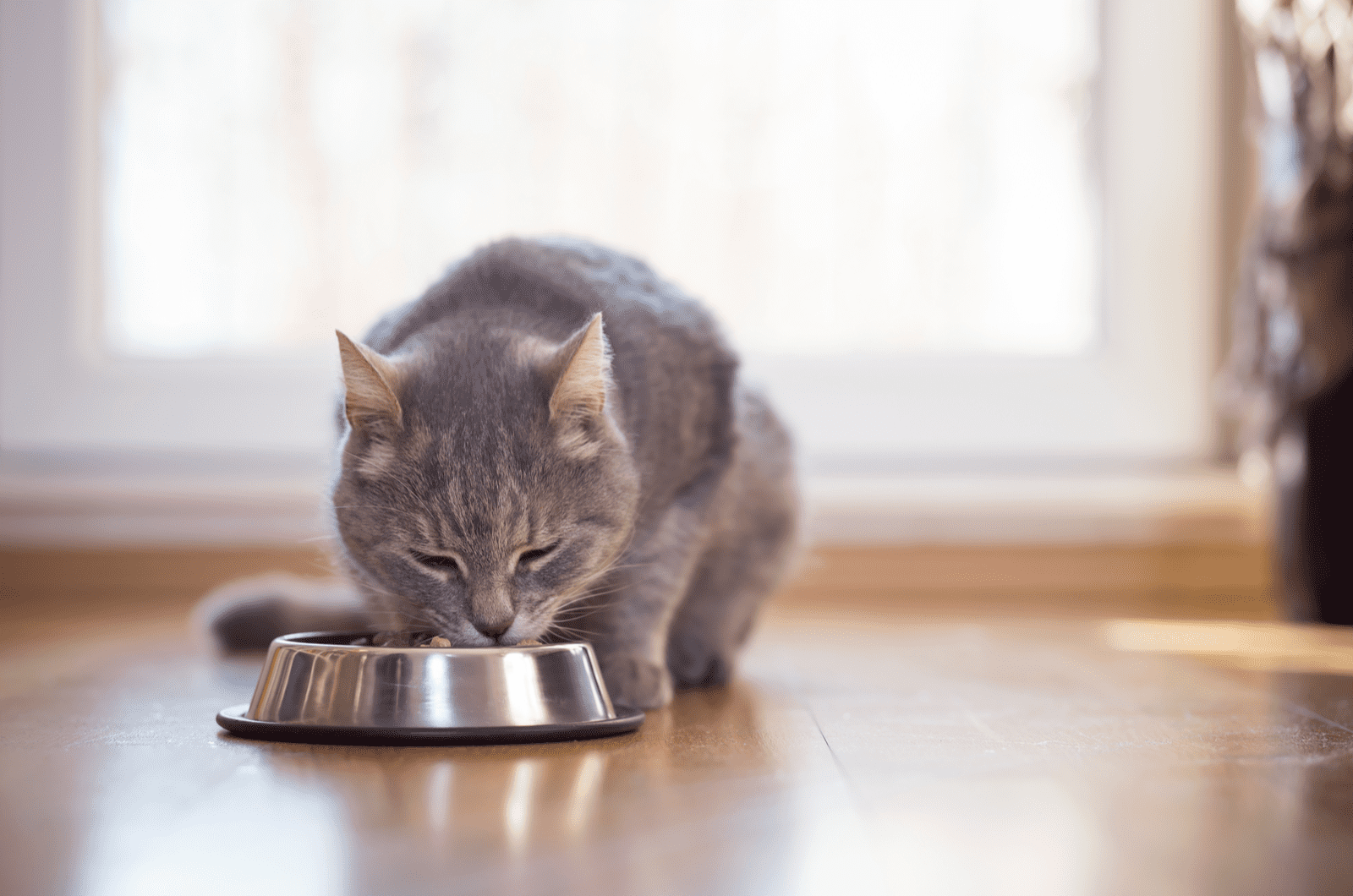
What Is The Best Food For Cats?
The best food for cats is meat because cats are obligate carnivores and they need food that is rich in protein. Cooked meat is the best food for cats; you should avoid giving raw meat to your cat.
What Does Lamb Contain?
Lamb meat contains protein, zinc, calcium, niacin, iron, potassium as well as vitamin D, vitamin B2, and vitamin B12. It also contains riboflavin and all the necessary amino acids that a cat needs in order to survive and improve its immune system.
What Are The Benefits Of Lamb For Cats?
Cats can benefit from eating lamb meat as it contains high amounts of niacin, taurine, phosphorus, and similar nutrients that are important in preventing things such as taurine and niacin deficiency.
Moreover, it helps them to improve their immune system, as well as keeping them in good condition.
Can Lamb Meat Cause Any Side Effects?
The bad thing is that lamb meat contains high amounts of carbohydrates and has a high fat content which is not good for cats as it may lead to obesity and other health problems.
What Are Some Lamb Substitutes?
Some lamb substitutes include mutton, veal, beef, pork, chicken, turkey, fish, goat, etc.
Final Thoughts
We already knew that cats are obligate carnivores and that their diet should be based on meat and protein. But not every meat is healthy for cats, and that’s something every cat parent should remember.
Therefore, our main question was can cats eat lamb meat? The answer is yes, but in small amounts and only occasionally.
The reason why you shouldn’t give your feline lamb meat very often is because it has high fat content and may lead to obesity or more serious health issues.
Therefore, when feeding a cat lamb meat, make sure that it’s only given as an occasional treat, and cooked well, because you don’t want to infect your cat with parasites from raw meat.
Moreover, you should try avoiding certain human food as it may have dangerous consequences for your cat. So, before you offer something new to your feline friend, first make sure that it’s safe for her and that she won’t experience any negative consequences from eating it.

